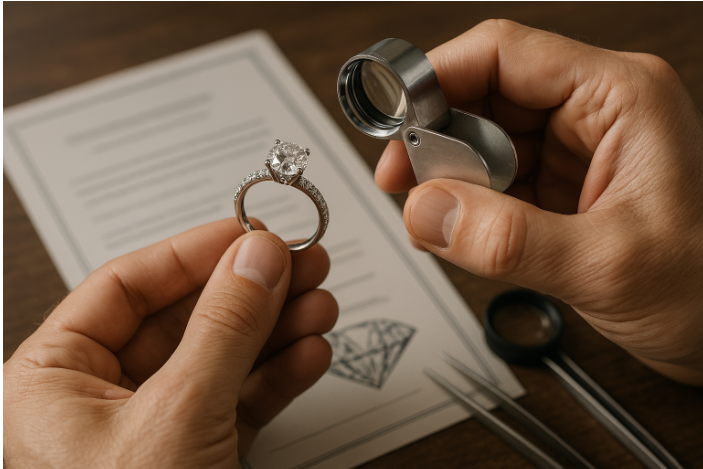Buying jewelry isn’t usually a daily thing. So when you see all these letters — GIA, AGS, IGI, HRD — slapped on a paper or online, it’s normal to think, “What does all this mean?”
Here’s the deal: those certifications? They’re like the jewelry’s report card. Except instead of grades, it tells you things like how good the diamond’s cut is, how clear it is, how big it is — the important information. Because without that? You’re basically buying something pretty and hoping for the best. Not a great plan.
Now, if you’re checking out diamond jewelry, don’t discount all your options. Lab-grown diamonds are the real deal. They just got made in a lab instead of underground. Same sparkle, same everything. The certification is what proves it — like saying, “Hey, this diamond’s legit.”
Who’s Who in the Certification World?
Alright, here’s the scoop — the big four certifiers you’ll run into are GIA, AGS, IGI, and HRD. And when you’re looking for custom-made lab-grown diamond jewelry, that’s a mouthful.
GIA is the heavy hitter. They don’t mess around. Their standards are high, and most people trust their judgment.
AGS? They’re like the detail-oriented folks, focusing on how the diamond is cut. Zero means perfect for them.
IGI is big overseas and popular with lab-grown diamonds. Some say their standards are a bit softer, but they’re not a joke.
HRD? That’s the European heavyweight, based in Antwerp, the diamond capital. They’re super precise.
But honestly, don’t stress about memorizing all that. Just know these letters on a certificate mean someone reputable checked out your bling.
How Do You Know the Certificate Isn’t Fake?
Yes, there are fakes out there. So don’t just nod and take the paper at face value—especially with silver jewelry and diamonds.
You want to see a report number. Type the information into the certifier’s website and see if it pops up. If not? Walk away.
Check if the specs on the paper match what you’re buying. Same size, same weight. If not, red flag city.
And ask for the original or a digital copy from the official source. Don’t settle for grainy photocopies or screenshots.
If your seller’s suddenly all cagey when you ask about this stuff, shop elsewhere.
Why You Should Always Ask Questions
One of the best things you can do when buying jewelry, especially on a budget: just ask. Seriously. Don’t be shy or feel like you’re bothering anyone. You’re spending money — you deserve answers.
Ask about the certificate — not just if it exists, but the details. Who issued it? Can you see it online? Does the jeweler stand behind it?
And don’t stop there. Ask about the diamond, gemstone, or premium jewelry itself. Where did it come from? Was it ethically sourced?
Sounds intense? Yes, but these days it matters.
If the seller seems annoyed or dodges your questions, that’s your cue to walk away. No jewelry, no matter how shiny or premium, is worth feeling pressured or unsure.
Remember, you’re the customer. You get to be curious. And the right jeweler will be happy to talk you through all of it — no discomfort, no nonsense.
Why Care?
Because this isn’t just about a shiny thing. Jewelry can be memories, an investment, or even something to pass down one day. You want to feel good about it. Knowing about certifications helps you do that.
So, yes, whether you’re into classic mined diamonds or shiny custom-made lab-grown diamond jewelry, get the certificate. Don’t skip it.
Still fuzzy? No shame in that. Visit the certifier’s websites yourself or ask a jeweler who isn’t trying to sell you nonsense.
At the end of the day, jewelry should feel good in your hands and on your heart. That’s all that matters.


